Columbus Day/Indigenous Peoples Day
Because of the Columbus Day/Indigenous Peoples Day holiday, this is the last issue of Shelf Awareness until Tuesday, October 10. See you then!
Because of the Columbus Day/Indigenous Peoples Day holiday, this is the last issue of Shelf Awareness until Tuesday, October 10. See you then!
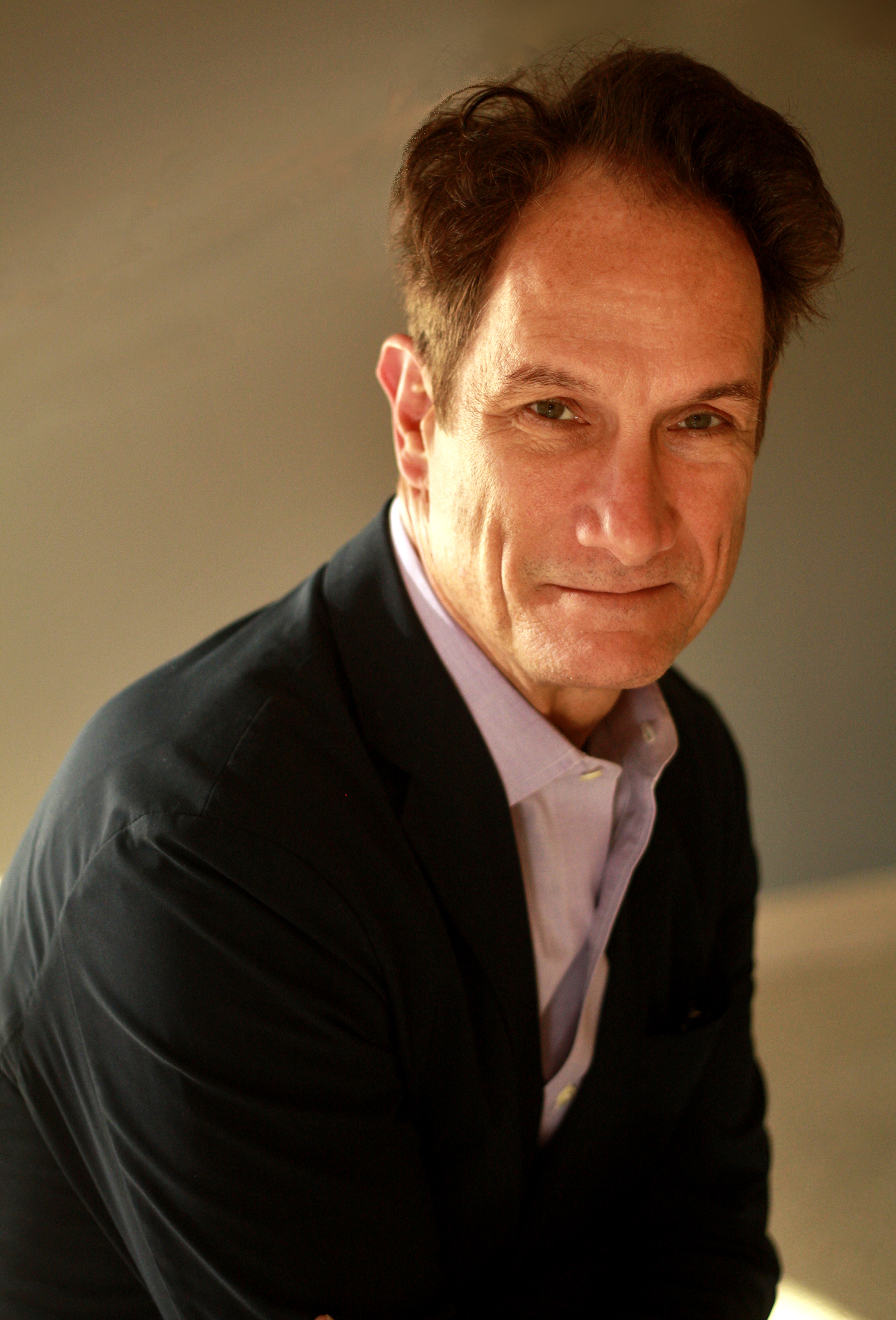 |
|
| Nicholas Latimer | |
Nicholas Latimer, v-p and senior director of publicity at Knopf, has accepted the VSO package after 40 years with the company. His last day in the office will be December 15. In a letter announcing the move, Reagan Arthur, Knopf executive v-p, publisher wrote: "When Nicholas started in 1983, Bob Gottlieb was the head of house, our founder, Alfred Knopf, was still with us, and Sonny Mehta wouldn't arrive for another four years. At that time, there were two separate departments publicizing our books--one dedicated exclusively to garnering reviews, the other devoted to arranging author interviews. When those two departments eventually merged, Nicholas continued to focus primarily on orchestrating reviews, acting as our ambassador to the entire book review community. He has tirelessly secured review coverage every season, working behind the scenes to cajole editors and critics into reviewing books they might not otherwise cover, and ensuring that Knopf books remain among the most reviewed across the industry, year after year."
In addition to his review work, 20 years ago Nicholas created a monthly e-mail to highlight Knopf's forthcoming books that currently goes to more than 1,200 producers, columnists, critics, and book review editors around the country. When Covid hit, the e-mail newsletter allowed the department to pivot quickly, with Latimer creating a weekly version to supplement book mailings. Latimer has also been "the unseen impresario" behind Knopf's milestones, memorials, and major events. He helped conceive and launch the Knopf Poem-a-Day program, and was the principal organizer and scorekeeper for award submissions. In 1993, Latimer phoned Toni Morrison at home to tell her that she had won the Nobel Prize.
Washington Post book critic Ron Charles said: "No, no, no, no, no! Aside from the reports of outrageous book bans around the country, this is the worst publishing news I've heard in ages. Twenty-five years ago, Nicholas was the first person in the industry to provide some kind guidance to a green book critic who thought a 'galley' was a small kitchen. I quickly realized that he was not just the nicest publicist, he was the best. He knows his books. He knows my audience. He even knows me! (Now that he's leaving Knopf, perhaps it's safe to reveal that he would sometimes whisper over the phone, 'Ron, you can skip this one.') His famous blend of dedication, hard work, brilliance, and trustworthiness has set the gold standard for the industry. It'll never be the same around here without him, but God knows the man deserves to finally read whatever the hell he wants."
Stuart Applebaum, emeritus executive v-p, corporate communications, PRH, commented: "In a Penguin Random House blessed with a multitude of exceptionally skilled and caring publicists and public relations and communications executives, Mr. Latimer is sui generis. A thoughtful publishing strategist and media tactician, and a compelling copy writer, he has lovingly brought many decades of Knopf books and authors to the attention of millions of readers, eschewing credit he properly bestowed on their editors, marketers, and publishers. Several generations of us have benefitted, and learned, from his experience, generosity, and humility. I am just one of many in our community who will envy his future collaborators."
 |
|
| Craig Popelars | |
Craig Popelars has left Tin House Books to pursue other personal and professional interests, the company said yesterday. Masie Cochran has been named interim publisher in addition to her role as editorial director.
Popelars, who joined Tin House as publisher in 2019 after a long career at Algonquin Books, said, "I want to share my deepest gratitude to the outstanding and inspiring staff at Tin House, as well as the immensely talented authors, who made my time with the program so rewarding. I would also like to thank the wonderful booksellers, librarians, agents, media, and especially our distribution partner, W.W. Norton & Company, who continue to be such a supportive and important part of helping to elevate the Tin House publishing program. I feel both thankful and proud to have been a part of helping further expand the essential and vibrant work that Tin House brings to the greater literary community."
Tin House owner Win McCormack said, "We thank Craig for the contributions he's made to Tin House. He has been an asset to our program, and we wish him well with his future endeavors."
Cochran has been with Tin House since 2011, for the last four years as editorial director. She previously worked at InkWell Management Literary Agency.
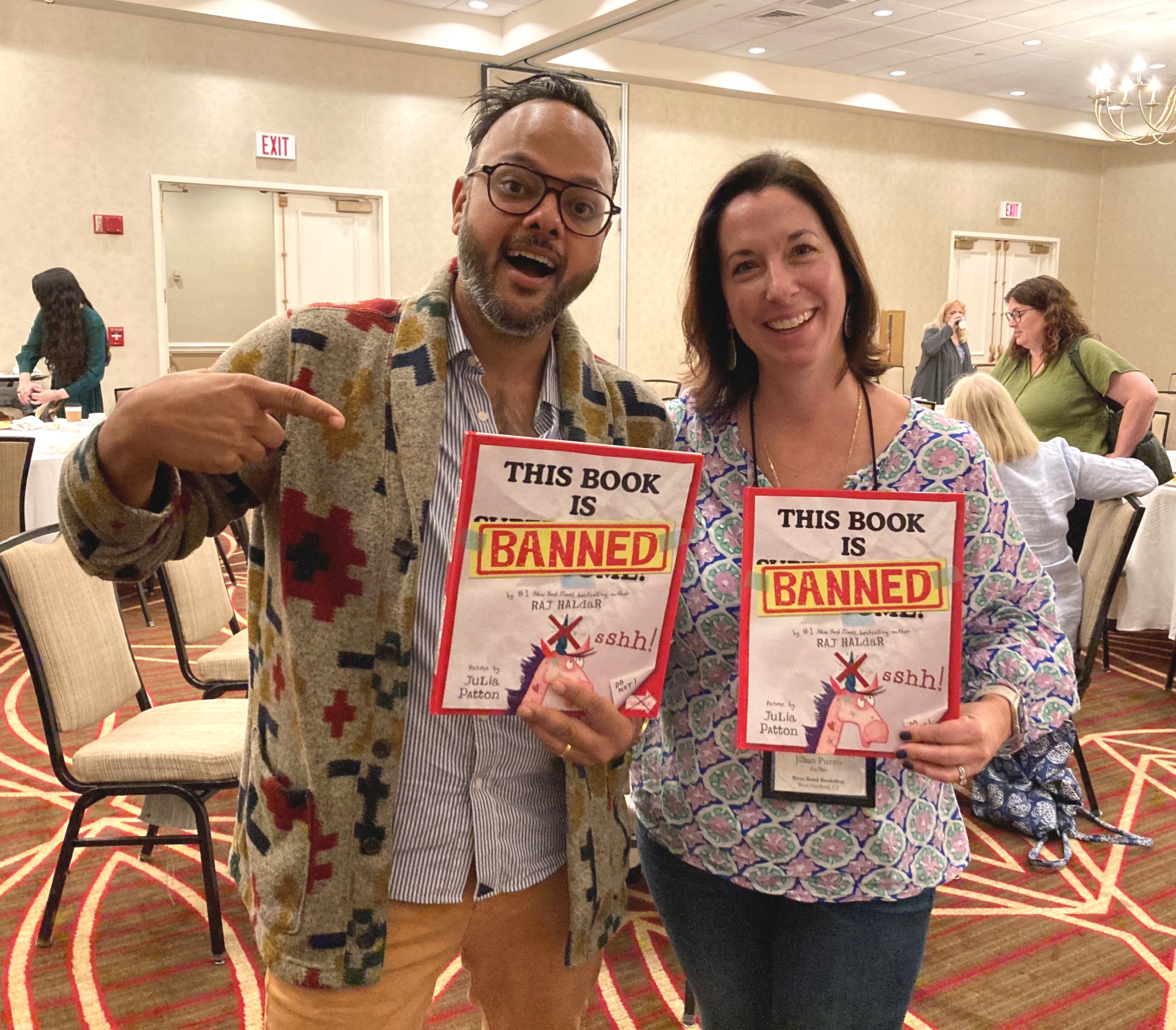 |
|
| Raj Haldar and Jillian Puzzo, River Bend Bookshop, West Hartford, Conn., at NEIBA this week. | |
Raj Haldar, also known as Lushlife, is an American rapper, composer, and producer from Philadelphia, Pa. His third picture book, This Book Is Banned (Sourcebooks Explore), was released at the end of September, right before Banned Books Week. Haldar took a moment out of his day at the NEIBA Fall Conference to chat with Shelf Awareness about This Book Is Banned, his hopes for the title, and Banned Books Week.
You were working as a rapper before you began writing?
Rapper, producer, musician all around. From the age of five, the only thing I wanted to do was be a musician. It was the mid-'80s and I would put on a gardening glove and look in the mirror and pretend I was Michael Jackson. You know that whole thing. I studied classical piano because that's what my immigrant parents reflexively put me in. I grew up in Jersey and it was kind of the golden era of rap music when I was in middle school in the '90s. It was happening all around me and was the vernacular of my youth. I started playing jazz in one part of my life, but then being obsessed with hip-hop and sampling that jazz in another part of my life.
All of that is to say that I never wanted to do anything besides be a musician. I pursued that for many years, and it was very fruitful--doing my own stuff, producing for others, touring.
(Let me tell you that book tours are a lot more relaxing than music tours. You have to be the life of the party every night for two months straight. I need a lot more time to recharge now.)
What I ended up realizing was that 1. I love words and wordplay and 2. I like making stuff. It happened to be records for a while...
How were your immigrant parents about that?
They never really understood it, but they were very supportive.
That's awesome.
Yeah. My brother is seven years older than me and a cardiologist so they kind of also got that. It gave me a lot more latitude to do my thing.
So, loving words and wordplay, it felt like it was a natural extension into books?
My mother was a high school chemistry teacher in India but, when she came here in the mid-'70s, she became an early childhood educator. It was always clear to me that she was a natural early childhood educator. I think having a mom like that built something into my very early that allows me to be a good communicator with kids. To kind of dial into what kids will find engaging and funny.
My parents never got what I was doing in hip-hop but my mother, especially as an early childhood educator, is really happy to see me explore this world that she's also so close to. I'll say... P Is for Pterodactyl, she wasn't a naysayer, but she was like, "Really?" But This Book Is Banned... one of my proudest moments in life was showing her the final book. She said, "This one. It's really good. It's necessary." That meant more to me than many other accolades there could be.
And so, the precursor to this book was your first book.
Well, P Is for Pterodactyl is a book about the love of the English language. The book highlights a diversity of people in it but there was nothing that made me think it could raise the ire of the book banners. We decided to make "O" for "Ouija," which is just a board game that Milton Bradley sells. It's sort of silly. It wasn't just one or two people [who complained]--for a while there I was getting quite a bit of hate mail calling me a tool of Satan. There were all sorts of unwelcome comments. That's what set me on this path. I was incensed by it as a creator, but I was also thinking about our civic life in this country. I started looking into what was going on with this absurd inflection point that we've reached.
Was the book banned?
I didn't have an official challenge but there were calls to take it off shelves. If you go look at reviews online, there's a large minority of reviews that are basically these people wanting to get the book removed.
That experience gave me personal insight into what so many other authors are dealing with--and in a much more personal way. For this, it was silly. It's a Ouija board. It's a silly thing to me. I feel personally attacked as a creator but it's not attacking my person. I was talking to Maulik Pancholy and his book, Nikhil Out Loud, is a middle-grade story about a brown, Indian, LGBTQ+ boy and has been banned. He grew up in Florida and wanted to do a school visit at his own alma mater and they didn't want to have him. Those are the experiences from the side of the author that I was super incensed by. And the number of picture books that have been banned and challenged? It became very clear to me that there needed to be a picture book that helped kids contend with the idea of book bans and censorship and what it means to their lives. Honestly, the toughest part, once I decided to do it, was making it funny.
It does have a sad ending.
It does. Yeah. My daughter doesn't like the ending. But, unfortunately, the reality is that if these book bans continue, there will be a sad ending.
The first book came out in 2018 and you had the backlash, then a pandemic, then you became a father. Was this book brewing all that time?
I think I've been working on it for about two and a half years. And, sadly, in the two and a half years I was working on it, book bans just got worse. It was also the first picture book I worked on in earnest while having a little sentient three-year-old around. I didn't show it to her but, by the osmosis of being a father, I was in tune to the things in children's lives. You know, things like avocados being banned. I don't think I had many avocados growing up. But kids today? That's a very permanent fixture in their lives. Being able to pull together a collection of ideas and objects that are in the purview of a very early reader's life felt like the best way to be funny: "Oh no! Birthday parties are banned?" Now reading it to kids for the first time, I'm experiencing 200 kids having an existential crisis at the same time: "Birthday parties and birthday cakes are banned? Noooooooo!" When I see that, I know it's connecting with them. They're getting what it means to have ideas and voices censored and quelled.
So, how did you make it funny?
I learned from P Is for Pterodactyl that being subversively educational is a great way to connect with kids. I could have executed that book in a much more didactic way. I chose not to and I think that's partially why it worked. I brought that same kind of ethos to This Book Is Banned. Really, once I figured out the style of the book [interactive, fourth wall breaking] it was all about how much I could ratchet up the absurdism and the fun. I knew the payload of the message was there on the last page, so I tried to have as much fun as I could with the absurdity of the banning throughout. One thing that I'm proud of--not that I want message to be aside but--message aside, it's a fun book to read. That's what I hope will ensure they don't just read it once and put it down. I hope they'll keep coming back to it because it's a good time.
And what has the response to this book been like so far?
I made this with librarians and booksellers and educators in mind because they're the ones on the frontlines of this fight. They need all the tools they can get to hold this important conversation. I've never in my somewhat limited experience felt this level of support. Every time I open my phone, there's another indie bookstore posting about it. Also, going into schools and seeing the book really connect has been awesome.
I will say, though, that I was in the suburbs of Pennsylvania the other day doing a book signing and the bookseller told me they had tried to get me some school visits. Every administrator they talked to said they didn't want to open up that can of worms with their kids. That really bummed me out.
Ending up in places that are generally pretty liberal has me preaching to the choir to some extent. I'm trying to find ways and am working closely with PEN America to try to get to Florida or parts of Pennsylvania or Texas. After having gone through many release cycles for books and records, I know that the morning your project comes out is stressful. I always try to fill up that time. So, what I did to occupy myself was find a spreadsheet from the Florida Department of Education that listed every school district that faced a challenge or ban. We found the media services director for each school and sent them a book.
That's a great thing to do.
There's a component to wanting to have this book in the world that I think needs to be coupled with direct action. So, I'm trying to find ways to do that. Some of it is school visits, some of it is mailing... I just have to keep pushing.
Lastly, is there anything you want to say to booksellers?
From my travels in going to bookstores across the country, I am inspired by booksellers and all these amazing, ingenious ways they find to push back against book bans and censorship. Everything that they do is inspiring to me. I hope that This Book Is Banned can do a little bit to help them have these conversations in their communities before This Book Is Banned is banned. --Siân Gaetano, children's and YA editor, Shelf Awareness
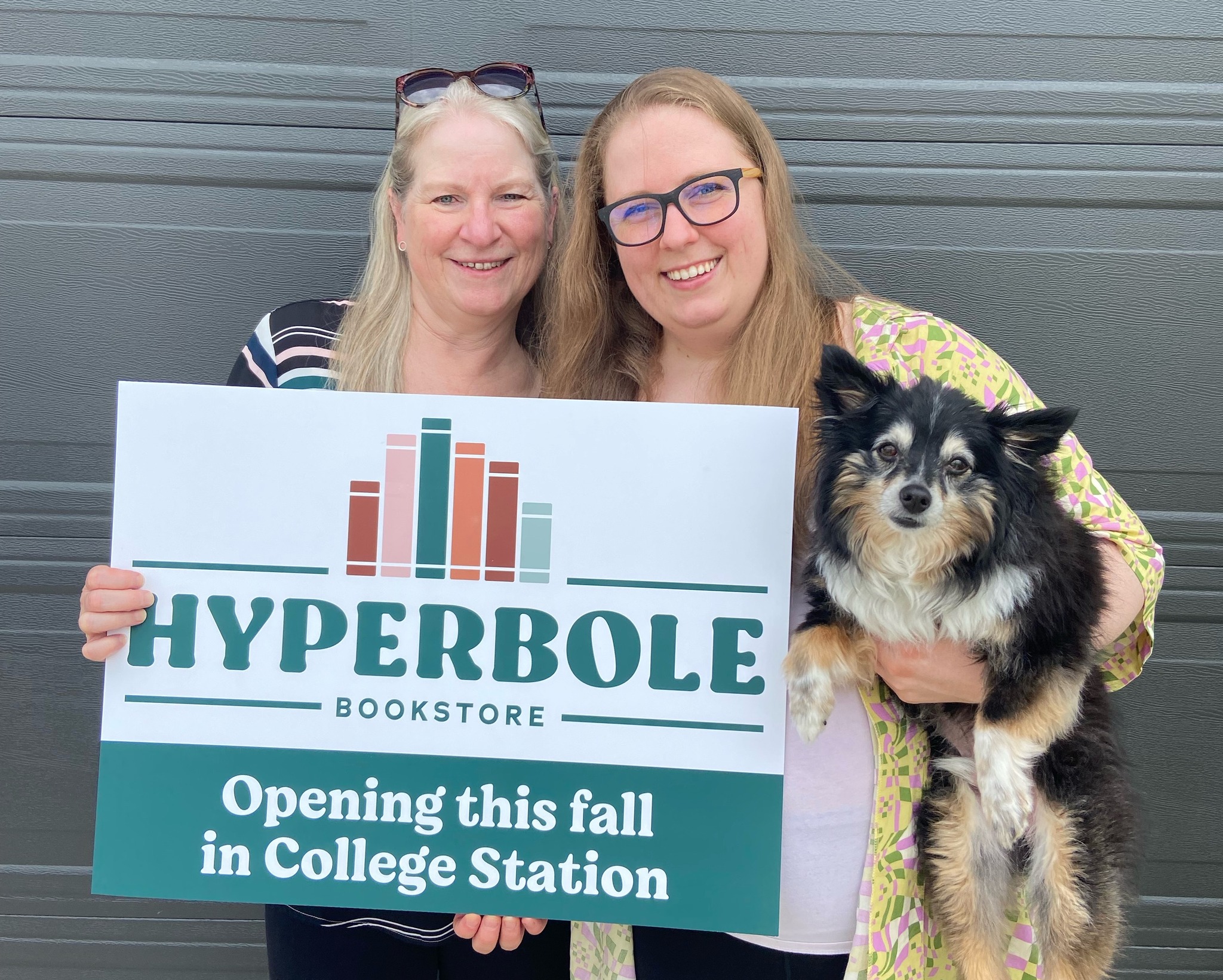 |
|
| Kathy and Kalena Miller | |
Hyperbole Bookstore will open today, October 6, at 1275 Arrington Rd., Ste. 102 in College Station, Tex. KBTX reported that co-owners Kathy Miller and her daughter, Kalena Miller, were inspired by their love of literature and writing to launch their own bookshop. A grand opening celebration is planned for October 13.
"My mom and I are super close and one thing that we share is our love of books. Being able to create something that means so much to both of us was really special," said Kalena Miller.
"What I want to do is to be able to walk over to a shelf, pull a book off of it and say I know this one is something you're going to love and hand it to them. Perhaps even an author that they've never read before," Kathy Miller added.
The co-owners lived in College Station from 1998 to 2011, while Kalena Miller was in school and Kathy Miller was a professor at Texas A&M University. "Though we loved living in Aggieland, we longed for an independent bookstore and dreamed of opening our own one day," they noted on the bookstore's website.
After a decade pursuing careers in writing, editing, and publishing in other parts of the country, they moved back to College Station and are fulfilling their dream. "We're thrilled to create a space where book lovers can feel comfortable browsing, exploring new titles, and joining in community with other readers in the Brazos Valley," they wrote.
 The European & International Book Federation's RISE Bookselling program is launching its Reviving the High Street campaign to address challenges in the face of online retail growth, rising overhead costs, and a lack of investment in local infrastructure. The campaign is meant "to issue a clarion call to local politicians and stakeholders," urging "immediate, practical measures to revitalize the high street, ensuring its resilience and prosperity for years to come."
The European & International Book Federation's RISE Bookselling program is launching its Reviving the High Street campaign to address challenges in the face of online retail growth, rising overhead costs, and a lack of investment in local infrastructure. The campaign is meant "to issue a clarion call to local politicians and stakeholders," urging "immediate, practical measures to revitalize the high street, ensuring its resilience and prosperity for years to come."
Through Reviving the High Street, RISE Bookselling seeks to highlight booksellers' unusual value, raise awareness of the challenges they face; and propose concrete solutions. The campaign has issued Nine Calls to Action, demanding action from policymakers and stakeholders:
Noting that local businesses, especially bookshops, "play a vital role in maintaining the economic vibrancy, charm, and cultural richness of towns," the campaign is making an urgent call for "political leadership, investment, and support."
---
 The Czech Republic will be the Guest of Honor at the 2026 Frankfurt Book Fair. The official agreement was signed at a ceremony this week in Prague by Frankfurter Buchmesse director Juergen Boos and Czech Minister of Culture Martin Baxa. The Czech Republic will be represented at this year's fair by 23 publishing houses and through its own program.
The Czech Republic will be the Guest of Honor at the 2026 Frankfurt Book Fair. The official agreement was signed at a ceremony this week in Prague by Frankfurter Buchmesse director Juergen Boos and Czech Minister of Culture Martin Baxa. The Czech Republic will be represented at this year's fair by 23 publishing houses and through its own program.
"I am very pleased that the Czech Republic will appear as Frankfurter Buchmesse's Guest of Honor in 2026," Boos said. "I'm especially pleased about the motto for the country's presence at the fair: 'Czechia--A Country on the Coast.' It's a maritime description of a landlocked Central European country. It catches the eye, it stimulates the imagination--far beyond the literary motif of Bohemia by the Sea. We are also looking forward to a Guest of Honor program featuring contemporary literature represented by authors such as Radka Denemarková, Jáchym Topol, and Kateřina Tučková. Another program focus: the cultural and literary perspective of a country located in the heart of Central Europe."
Baxa commented: "I am delighted to learn that the Czech Republic will be the Guest of Honor at Frankfurter Buchmesse 2026. The Czech Republic's appearance at the fair is a major opportunity for the Czech book industry and the country's entire cultural sector. It's not only a chance to present the high quality of Czech literature to the world, but also an investment in the future. I would like to thank all those who have contributed to this outstanding outcome. But the work is not yet done--on the contrary. The biggest part is still ahead of us and I'm already looking forward to the results."
---
 "Between home and work there is a special 'third place." The Canadian Independent Booksellers Association's "Meet Our Member" series focused on River Bookshop, Amherstburg, Ont., which was opened by Richard and Colleen Peddie in 2020. Among the highlights of the q&a with lead bookseller Meghan Desjardins:
"Between home and work there is a special 'third place." The Canadian Independent Booksellers Association's "Meet Our Member" series focused on River Bookshop, Amherstburg, Ont., which was opened by Richard and Colleen Peddie in 2020. Among the highlights of the q&a with lead bookseller Meghan Desjardins:
Your goal is to be the "third place" for community members. Why is this important to you and how do you meet this goal in the day-to-day?
The idea of the "third place" is foundational to Richard and Colleen's vision. Our core values--educate, entertain, inspire, engage--impact everything we do. We aim to make the store itself a community space. (Come talk to us! Hang out for a while!) We also have tons of events going on every month like readings, book club initiatives, partnerships with local businesses, and more. We're also fortunate to have a beautiful event space above the bookstore called Hole in the Wall, which is plush and spacious, equipped with an audio-visual system, and allows us to host as many events as our hearts desire. (Which is currently very many!) --Robert Gray
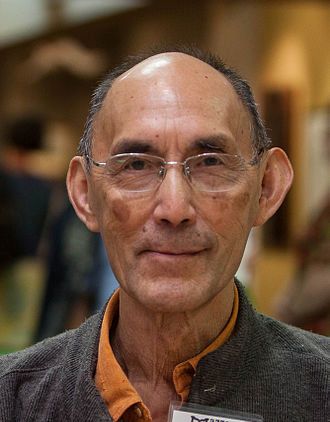 |
|
| Ed Young | |
Ed Young, "whose illustrations in some 100 children's books, many of which he also wrote, mesmerized young and not-so-young readers with intricate depictions of fairy tales, poetry and his own life story as a Chinese immigrant," died September 29, the New York Times reported. He was 91.
Trained as an architect and having worked as a graphic designer, Young never intended to become an illustrator of children's books. But a chance opportunity to work on the book The Mean Mouse and Other Mean Stories (1962) by Janice May Udry led to widespread praise, a deal with an agent, and a 60-year career as one of the country's most beloved children's artists.
Young "churned out books across a wide variety of subjects and media, among them collage, pencil and charcoal, and experimented with different bookmaking formats, like accordion," the Times wrote, adding that many of his favorite techniques drew on traditions from his native China, which also inspired much of his subject matter.
Lon Po Po (1991), a traditional Chinese version of Little Red Riding Hood, was the first book that he also wrote. It won a Caldecott Medal.
"I feel that my job to be in this country is to learn as much about the West as I can and introduce the East as much as I can," he said in a 2005 interview with the website Teaching Books. "So, my books are a study of cultures and of hearts from both sides, and introducing one to the other."
Born in Tianjin, Young was three when his family moved south to Shanghai, where they lived through the Japanese occupation of the city during World War II--an experience he recounted in The House That Baba Built (2011). When he was 17, he received a student visa to the U.S. and studied architecture and art. After college, Young began working with an advertising design studio in Manhattan, but found the job unrewarding and spent his lunch hours at the Central Park Zoo, drawing animals. When the studio shut down, friends suggested he try illustrating children's books, though he knew nothing about them.
Ursula Nordstrom, an editor at Harper & Row, liked his work enough to assign him to illustrate The Mean Mouse and Other Mean Stories. An award from the American Institute of Graphic Arts established him as one of the country's foremost illustrators. He won a Caldecott Honor award in 1968 for The Emperor and His Kite by Jane Yolen, and another Caldecott Honor award for Seven Blind Mice, which he also wrote, in 1993.
Young took up tai chi in 1964 and became a respected teacher. "The practice of tai chi is about discovering yourself," he said in an interview. "Art is about the same thing--find out about yourself. How do you produce something that is satisfying? How do you state something in the simplest manner for the maximum effect? How do you use a moment? How do you wait for the opportunity?"
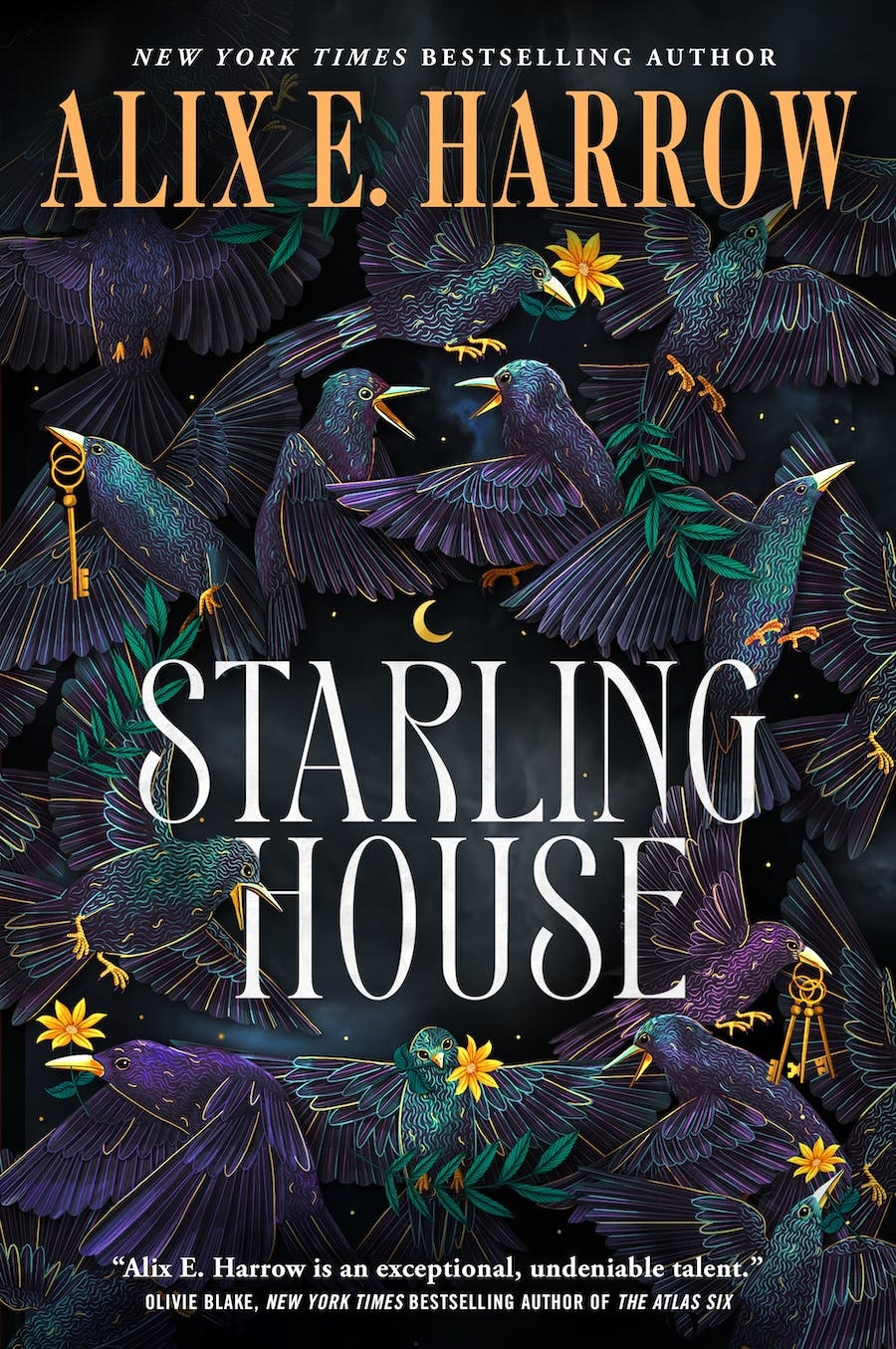 The October pick for Reese's Book Club is Starling House by Alix E. Harrow (Tor Books), which Reese Witherspoon described this way: "This book has everything you could possibly want this fall... a cursed town, a haunted house, a vivid and eerie setting--plus, characters willing to risk everything."
The October pick for Reese's Book Club is Starling House by Alix E. Harrow (Tor Books), which Reese Witherspoon described this way: "This book has everything you could possibly want this fall... a cursed town, a haunted house, a vivid and eerie setting--plus, characters willing to risk everything."
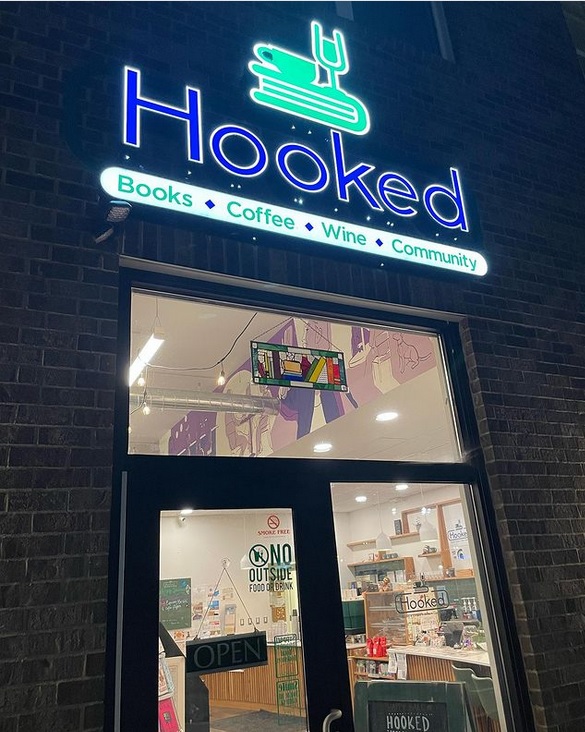 "As the days get shorter and the nights get longer--we're your bright welcoming & fun bookstore & cafe--right into the late hours," Hooked, Lansing, Mich., posted on Instagram.
"As the days get shorter and the nights get longer--we're your bright welcoming & fun bookstore & cafe--right into the late hours," Hooked, Lansing, Mich., posted on Instagram.
At Simon & Schuster Children's Publishing:
Chrissy Noh has been promoted to v-p, director of marketing. She was most recently executive director of marketing.
Lisa Moraleda has been promoted to v-p, director of publicity. She was most recently executive director of publicity.
---
At Scribner:
Paul Samuelson has been promoted to publicity director.
Mia O'Neill has been promoted to senior publicist.
Georgia Brainard has been promoted to associate publicist.
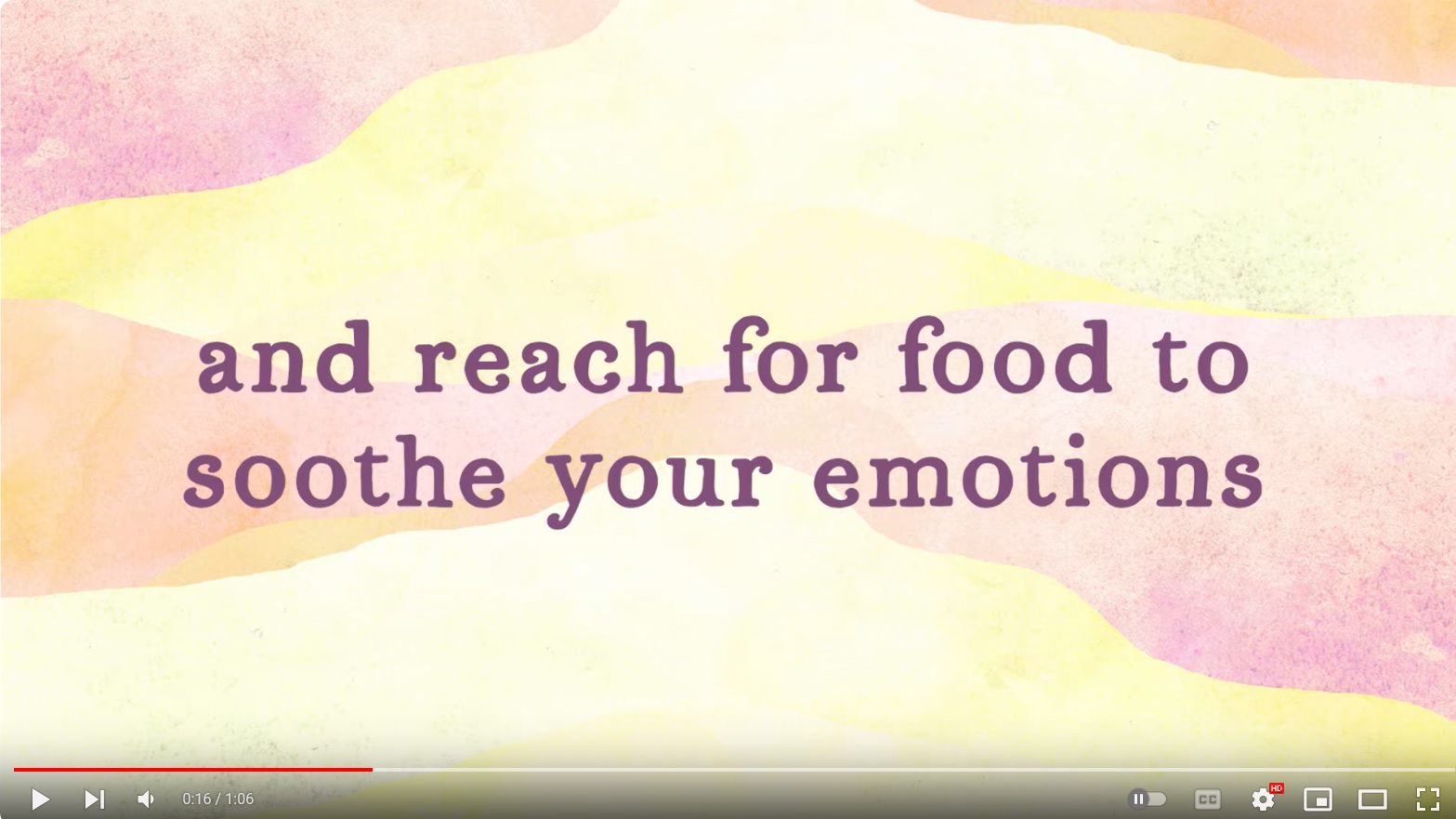 Healing Emotional Eating for Trauma Survivors: Trauma-Informed Practices to Nurture a Peaceful Relationship with Your Emotions, Body, and Food by Diane Petrella (New Harbinger Publications).
Healing Emotional Eating for Trauma Survivors: Trauma-Informed Practices to Nurture a Peaceful Relationship with Your Emotions, Body, and Food by Diane Petrella (New Harbinger Publications).
Today:
Fresh Air: Paul Holes, author of Unmasked: My Life Solving America's Cold Cases (Celadon Books, $17.99, 9781250622808).
Here & Now: Michael Mann, author of Our Fragile Moment: How Lessons from Earth's Past Can Help Us Survive the Climate Crisis (PublicAffairs, $30, 9781541702899).
Tomorrow:
Good Morning America: Hilarie Burton Morgan, author of Grimoire Girl: A Memoir of Magic and Mischief (HarperOne, $29.99, 9780063222731).
Apple TV+ has released a trailer for The Buccaneers, an eight-episode drama based on Edith Wharton's final novel, that will make its global debut November 8 with the first three episodes, followed by new episodes every Wednesday through December 13.
The music-driven series blends 1870s English aristocracy with a modern soundtrack produced by Stella Mozgawa (of the band Warpaint), featuring songs from performers like Taylor Swift, Maggie Rogers, Bikini Kill, Yeah Yeah Yeahs, Angel Olsen, Brandi Carlile, and more, along with original music from Folick, Lucius, Alison Mosshart, Warpaint, Gracie Abrams, Sharon Van Etten, Bully, Danielle Ponder, and more, as well as series composers AVAWAVES.
The Buccaneers stars Kristine Frøseth, Alisha Boe, Josie Totah, Aubri Ibrag, Imogen Waterhouse, Christina Hendricks, Mia Threapleton, Josh Dylan, Guy Remmers, Matthew Broome, and Barney Fishwick. The series was written by Katherine Jakeways and directed by Susanna White, who also serve as executive producers, alongside Beth Willis. It is produced for Apple TV+ by The Forge Entertainment.
The winners of the New England Book Awards, sponsored by the New England Independent Booksellers Association:
Children's: Homeland: My Father Dreams of Palestine by Hannah Moushabeck (Chronicle Books)
Middle Grade: Hoops written and illustrated by Matt Tavares (Candlewick Press)
YA: When the Angels Left the Old Country by Sacha Lamb (Levine Querido)
Nonfiction: Fen, Bog & Swamp: A Short History of Peatland Destruction and Its Role in the Climate Crisis by Annie Proulx (Scribner)
Poetry: The Diaspora Sonnets by Oliver de la Paz (Liveright)
Fiction: Yellowface by R.F. Kuang (Morrow)
---
Mayo Agard-Olubo won Hachette's Mo Siewcharran Prize for Kid Rex vs the Dastardly Dust Bunnies, the Bookseller reported. The award, named in memory of Nielsen BookData's former director of marketing and communications, was launched in 2019 and "aims to shine a light on unpublished fiction writers from Black, Asian, mixed heritage and minority ethnic backgrounds." This year, the prize was hosted by Hachette Children's Group and has focused on writers in the picture book genre.
The winner receives £2,500 (about $3,040), plus a letter from an HCG picture book editor giving feedback on their entry (and, if artwork has also been submitted, feedback from a designer). Agard-Olubo will also have introductory meetings with at least two literary agents, an introductory session with HCG's rights team, meetings with HCG's marketing and publicity teams, along with a ticket to the 2024 London Book Fair. The winner's entry will be forwarded to an HCG's acquisitions meeting and considered for publication with an advance against royalties.
The Doll that Could Not Play by Antoinette Brooks was the runner-up, winning £1,500 (about $1,825) along with a letter from an HCG picture book editor giving feedback and a hamper of HCG books up to the value of £200 (about $245). Authors of the shortlisted entries will be invited to attend a one-hour online picture book workshop with the HCG picture book team.
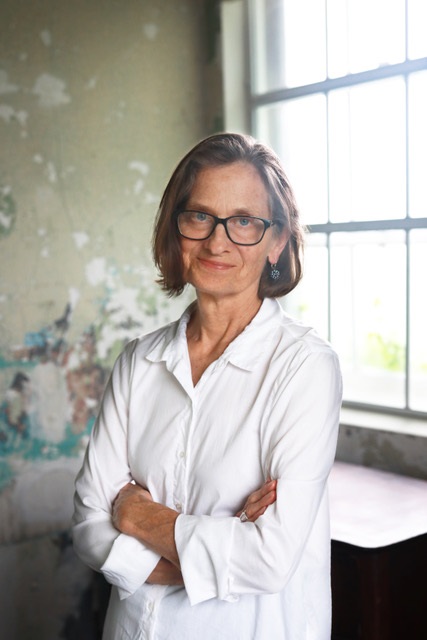 |
|
| photo: Theo Cote | |
Lydia Davis is the author of one novel, many collections of stories, two books of essays, and numerous translations from French and other languages. Her ninth work of fiction, Our Strangers (Bookshop Editions, October 3, 2023), is a collection of 143 stories, some only a paragraph in length, or an exchange of a few lines of dialogue.
Handsell readers your book in approximately 25 words or less:
This new collection of stories contains fiction from the past nine years. Most of them very brief, but some are longer and more traditional. Most were enjoyable to write (some painful), and I still smile at some.
On your nightstand now:
My (remote) book club is just now embarking on the works of the 18th-century English rural poet John Clare (a contemporary of Keats). I look forward to taking some time over each poem and enjoying the language of a different century, especially as the subjects are often the wildlife and countryside he knew so well.
We just finished reading Poverty, by America by Matthew Desmond, which is an essential call to action and self-examination on the part of those readers with any degree of affluence at all.
On my own, as a result of trying to divest possessions, I am eliminating books in my library and in the process exploring unread books that have sat on my shelves for many years. One is the very well-written and closely observed A Voice Through a Cloud by Denton Welch, an eccentric autobiographical novel about a long recovery from a disabling bicycle accident. At the same time, I'm reading--for the second time--How to Resist Amazon and Why by Danny Caine, a newly revised and updated version. It reveals with well-researched facts and passionate commitment even more about the appalling business practices and worker treatment of this destructive behemoth!
And very absorbing to me at present, because of my interest in attempts to restore our natural environment, is an English book dating back to the years after World War II. From the Waste Land by Edward Hyams is a detailed account of the arduous and adventurous project he undertook, together with his wife, of converting a plot of waste land into a productive garden-vineyard, with active help and intervention from local neighbors. He offers many strong political comments along the way, generally in favor of socialism and against capitalism!
Favorite book when you were a child:
There were many--I was a great reader. Most will not be surprising. The Secret Garden, Little Lord Fauntleroy, and others by Frances Hodgson Burnett; The Princess and the Goblin and The Princess and Curdie by George MacDonald; Hans Brinker, or the Silver Skates by Mary Mapes Dodge; Heidi by Johanna Spyri; The Good Master by Kate Seredy (set in Hungary, starring a wildly rebellious girl). Not to mention all the C.S. Lewis and Tolkien books.
Your top five authors:
That is as difficult as asking for my top five composers. Longstanding and influential favorites, of course, are Kafka, Beckett, and Joyce. More recent (though still longstanding) would be Grace Paley, Lucia Berlin, and Jane Bowles, among many others. Also Barbara Pym for sheer enjoyment. Then there are Thomas Bernhard, Peter Handke, W.H. Hudson (early-20th-century nature writer), Ali Smith, Flannery O'Connor, Chekhov. And a long list of poets, classics and contemporary, also essential for a prose writer.
Book you've faked reading:
I am, unfortunately, painfully honest, as a rule. But I have been guilty sometimes of remaining silent when the conversation turns to a book or author I feel I "should have" read, though I've found that as you get older, you just don't mind admitting things as much as you might have when you were young. If you haven't read certain books, you've done other things instead.
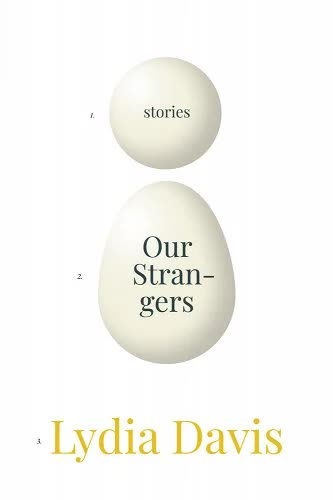 Book you're an evangelist for:
Book you're an evangelist for:
For a long time--years and years, decades--I urged people to read Lucia Berlin. Now that she has died, she has a wide readership. I'm glad people are reading her--she's very good. (She wasn't ambitious for fame and glory when she was alive, but she hoped her children might benefit after she was gone. Wonderful person.)
Book you've bought for the cover:
I can't think of any! I might open a book because of the cover, but not necessarily buy it. Long ago, the books published by the French publisher Gallimard all had the same cover design--simple, identifiable. A cream-colored background with contrasting border lines at the edges, typeface with title and author--that was it. You learned about the book through reviews and word-of-mouth, maybe took a peek at it in a bookstore, decided you were interested, or not. That was certainly more straightforward and less complicated for the publisher--the reader wasn't enticed to buy, but bought according to the content only.
Book you hid from your parents:
I don't remember hiding any books from them--except when I stayed up late reading with a flashlight under the covers.
Book that changed your life:
Another difficult question. If you're a reader and you think about what you read, every book has an effect, and the best ones have a subtle but ongoing and important effect--it's hard to measure. The most recent one that opened my eyes to another world and another concept was Metazoa by Peter Godfrey-Smith. It is about other creatures'--especially sea creatures'--degrees of awareness and self-consciousness, greater than you would expect.
Favorite line from a book:
I don't have a favorite. The sentence that obsessed me the most and that I struggled over (as a translator) was the famous first one in Proust's Swann's Way, simple though it seems: "For a long time I went to bed early." Oh, another I like that I read recently was from Tolstoy's Last Diaries: "and, while I cannot say I thought, ideas wandered through my head." I would rephrase it: "And though I can't say I was thinking, ideas were wandering through my head." We often remember things the way we prefer to have them.
Five books you'll never part with:
I am presently winnowing my library down to the books I'm glad to have in the house. The next culling will get closer to the books I'll never part with--too many to name. I won't be able to take them to the grave with me, but they'll still be there when I die!
Book you most want to read again for the first time:
I recently regretted having read all of Barbara Pym's novels, because I envied a friend who was reading one of them for the first time, but since, in the case of most books, I remember only about 5% of what I read, I could happily read all my favorites again--and probably will. Specifically, one of the first will be Moby-Dick.
Orbital by Samantha Harvey (Atlantic Monthly Press, $24 hardcover, 193p., 9780802161543, December 5, 2023)
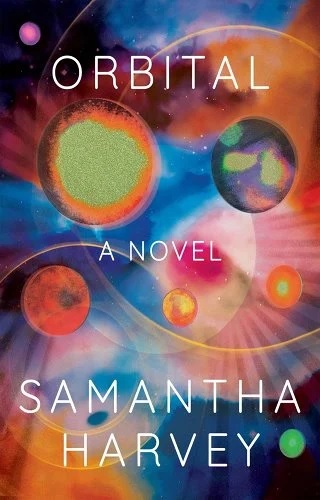 Samantha Harvey (Dear Thief) offers readers a slim but radiant novel of space, exploration, and meaning-making in Orbital, her fifth novel, which details the myriad depths held in just one day in the lives of six astronauts orbiting the Earth on an international space station.
Samantha Harvey (Dear Thief) offers readers a slim but radiant novel of space, exploration, and meaning-making in Orbital, her fifth novel, which details the myriad depths held in just one day in the lives of six astronauts orbiting the Earth on an international space station.
Six men and women circle the planet at 17,500 miles per hour, a pace that takes a standard 24 hours and "throws sixteen days and nights at them in return." This mind-bending math is just a small slice of the disassociation thrust upon the six in space. They whirl about the Earth at an unfathomable pace that feels to them like stillness, tracking days with ticks on the wall, making lists of joys and anxieties and memories, gazing at photos, and sending e-mails back to family at home. They study microbes, viruses, fungi, and bacteria; observe 40 mice and their reactions to adjusted gravity in space; make notes on the human experience of space stations and space itself; observe the Earth and its weather systems from miles and miles away.
It is in that last function, especially, that Harvey probes questions of the human experience and our innate connections to the planet we call home. They watch Earth, drawn to her not just by gravity but by the pull of her meaning, what the planet gives to each of them as individuals, as humans, as a home and a place of comfort and nourishment and meaning. "The earth is a mother waiting for her children to return, full of stories and rapture and longing. Their bones a little less dense, their limbs a little thinner. Eyes filled with sights that are difficult to tell." From their H-shaped space station, they have no power, "only their cameras and a privileged anxious view of its building magnificence."
With Orbital, Harvey gives readers a powerful novel that, in less than 200 pages, manages to explore questions of philosophy and religion, faith, existence, meaning-making, art, grief, and gratitude, just to name a few. In showing one day in the lives of just six individuals, she probes deep into the human experience as it teeters between the profound and the mundane--even, or perhaps especially, as experienced from the rarified vantage point of space. Her luscious and lyrical language is as close to poetry as it is to prose ("Outside the earth reels away in a mass of moonglow, peeling backward as they forge towards its edgeless edge"). Orbital is a gift of language, a meditation on meaning, and a beautiful exploration of perspective. --Kerry McHugh, freelance writer
Discover: In her fifth novel, Samantha Harvey offers readers a lyrical and poetic exploration of space, perspective, and appreciation for the planet that gives us life.
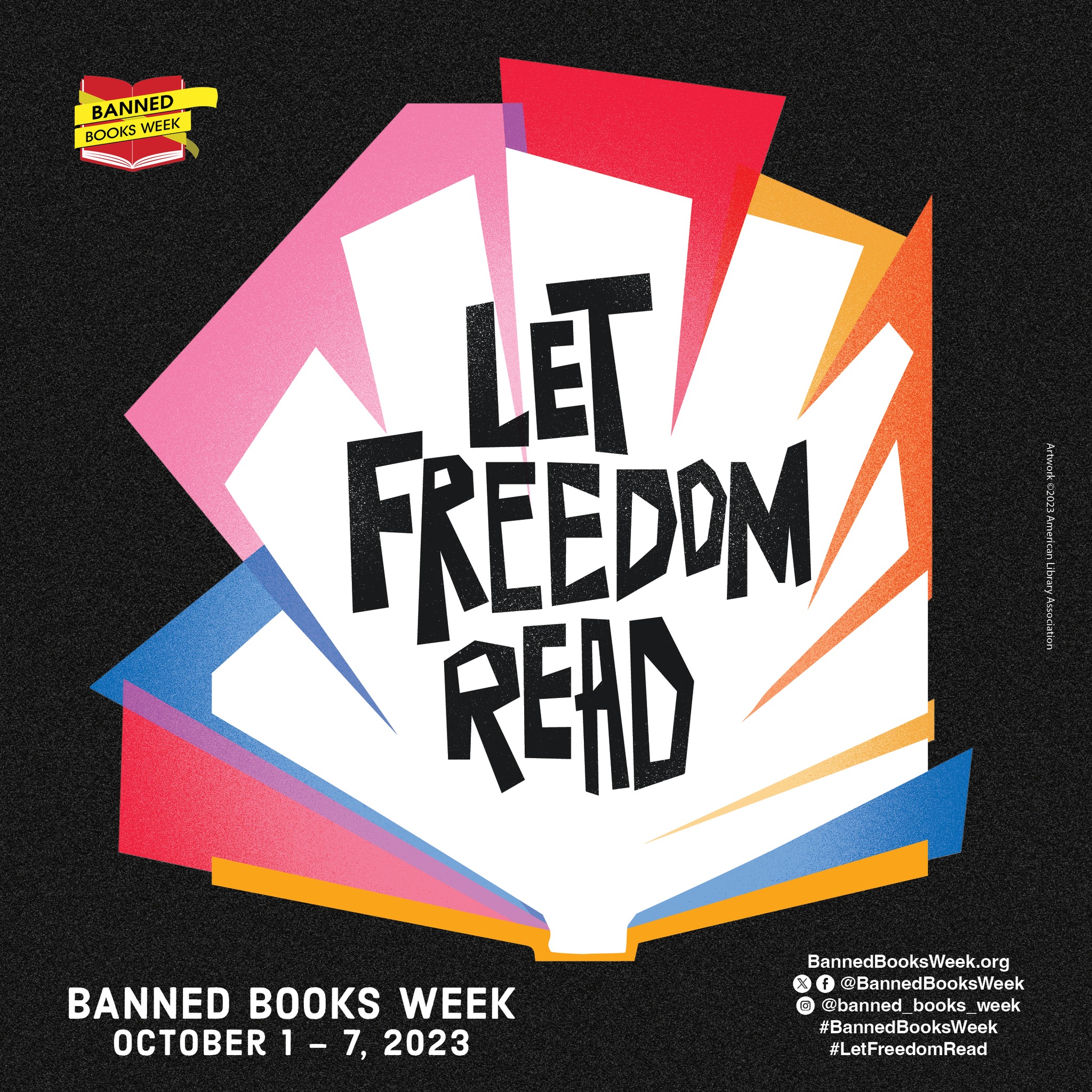 In January of 1982, the same year Banned Books Week would be launched, author Studs Terkel traveled to Girard, Pa. (pop. 2,500), where a group of parents had protested the use of his bestselling book, Working: People Talk About What They Do All Day and How They Feel About What They Do, in a Girard High School English class.
In January of 1982, the same year Banned Books Week would be launched, author Studs Terkel traveled to Girard, Pa. (pop. 2,500), where a group of parents had protested the use of his bestselling book, Working: People Talk About What They Do All Day and How They Feel About What They Do, in a Girard High School English class.
Terkel, who had been invited to the school "by a determined teacher backed by an equally firm school principal, spoke in the afternoon after talking to class after class in the morning about academic freedom and the meaning of his work," the New York Times reported, adding that he later pleaded his case "in the low and warm tones of a suitor, and the 650-member student body twice gave him standing ovations. 'I am deeply moved,' he said."
That night, however, at a meeting with parents, passions ran higher and some tempers flared. ''Mr. Terkel, you are corrupting the morals of our children,'' said one protesting mother. Although Working is based on recorded interviews with working people describing their jobs and lives in their own voices, "it was that profanity that stirred dispute, after the book had been in use in English classes for senior vocational students here for about seven years," the Times noted.
''We strongly object to profanity in the book and fear that students will receive a distorted view of the working world by reading it,'' said parent Linda Burns. Before his arrival, Terkel had observed, referring to the protesters: "The exquisite irony is that they are the heroes and heroines of this book." When he was asked why he had come to Girard, he replied: ''I came to see what makes you tick."
We're still trying to figure that one out, four decades later.
Daily media coverage (including here at Shelf Awareness) shows that the volume knob on book banning has been turned up to 11 in recent years. You already know the reasons why. The atmosphere is at once serious, damaging, sometimes dangerous, and sometimes, well, just absurd.
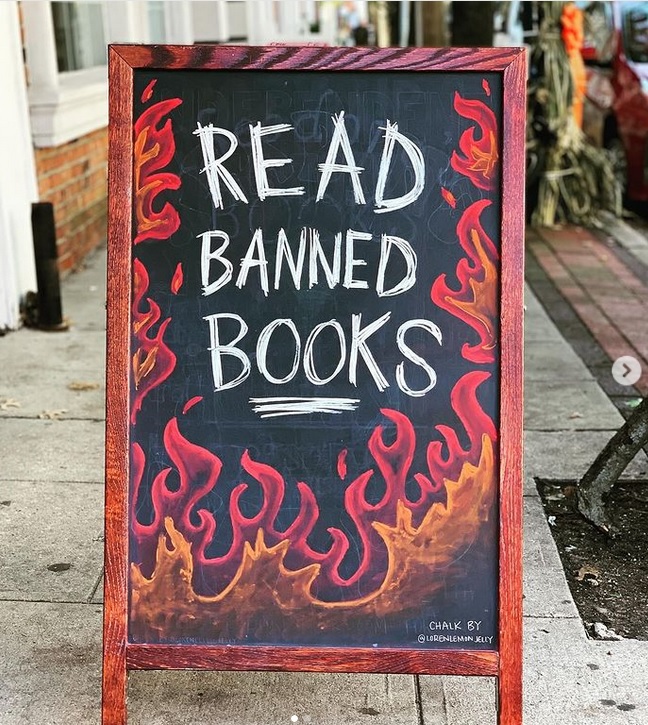 |
|
| At Theodore's Books | |
In North Carolina, for example, Charlotte-Mecklenburg Schools communications chief Shayla Cannady seemed intent recently on banning, wait for it, Banned Books Week. Cannady "sent a memo to principals asking them to cancel all events and messages associated with Banned Books Week, adding that such activities could violate North Carolina's new parents' bill of rights," WFAE reported, adding: "A few hours later, after schools had dismissed, Cannady e-mailed principals saying it's up to them to decide how to handle it, adding that 'it is not a violation or in any way associated with Parents Bill of Rights.' "
Oops.
The Onion happily fed the absurdity flames with a satirical (if maybe just a little too close to reality) piece headlined "Small Group of Parents Explains Why They Are Responsible for 60% of Book Bans." Among the reasons:
One of my favorite responses this week, however, was this social media post from Búho bookstore, Brownsville, Tex.: "WARNING! BANNED BOOKS AHEAD! Read at your own risk. In fact, DON'T! Don't even LOOK at the store when driving down Washington. Heck, don't even THINK about Búho for having such dangerous titles on our shelves!! These controversial books contain:
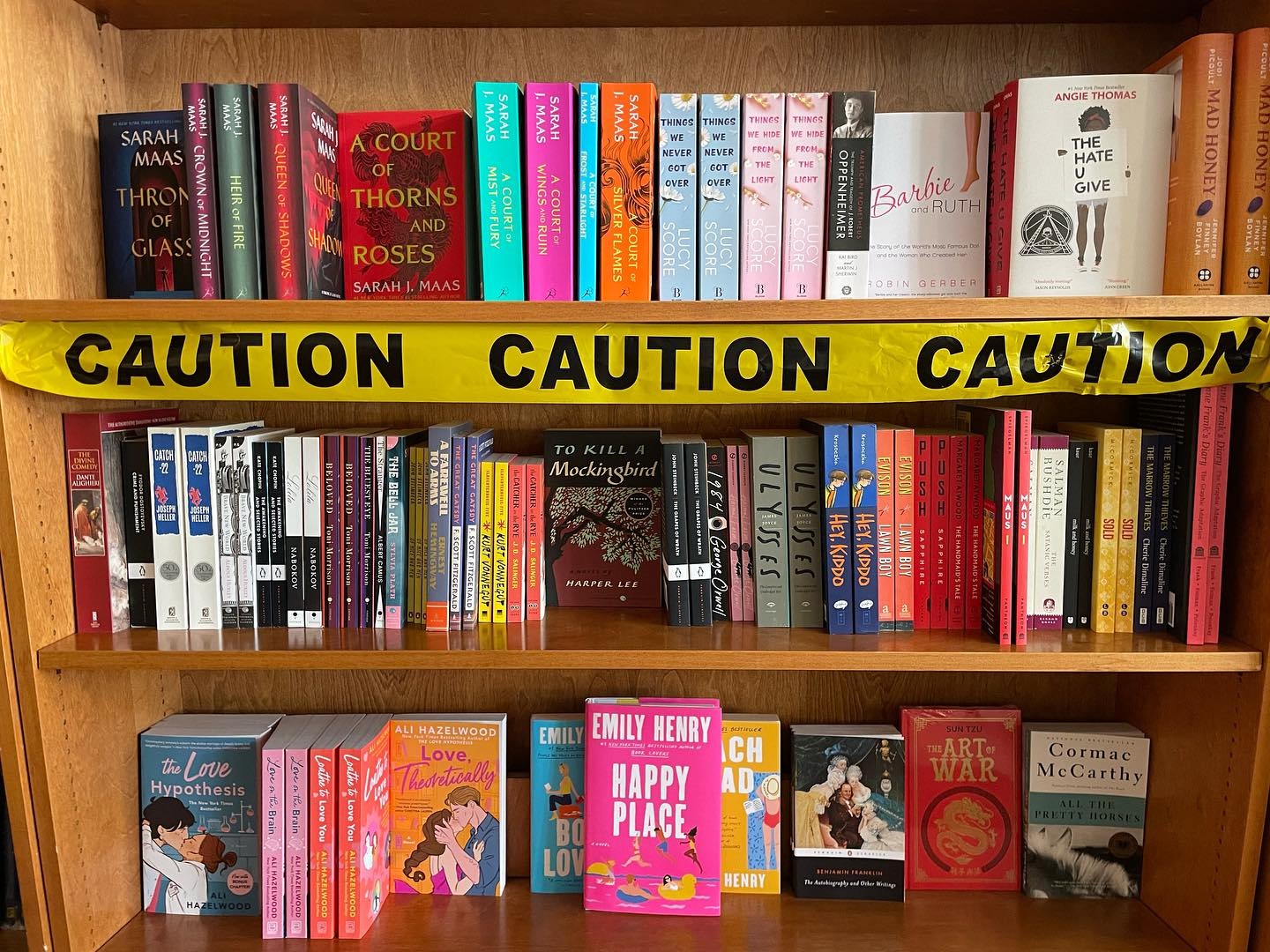 |
|
|
At Búho Books |
|
"During Banned Books Week, it's probably for the best that you hide your kids, hide your spouse, and hide yourself under the bed because you probably can't HANDLE what they have to say! I mean, if some public entities forbid them in their schools, they MUST be right, right? That's why I've taken proper precautions and have hidden the books behind this flimsy, tempting, and easily breachable 'caution' tape because those bureaucratic bigwigs think that these books should never ever ever ever ever ever ever ever [...many more "evers"] be read by anything with eyeballs (or ears, in audiobook form)."
Which brings me back to Studs Terkel in 1982. Challenged by one of the protesting students to read aloud a disputed passage in Working, Terkel opened a paperback edition and began, "leaving blanks for obscenities that were obvious to his audience," the Times noted.
The passage contained the words of a Brooklyn firefighter named Tom Patrick. Terkel said it summed up much of the meaning of his work and would not have been the same if Patrick had said, for example, "the world is all fouled up."
After a final ovation, Terkel, still speaking softly, told the students: "I hope you have a long, decent life, work hard--and READ."